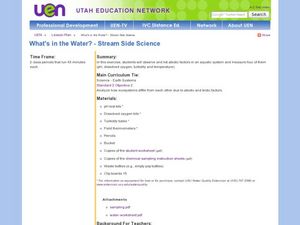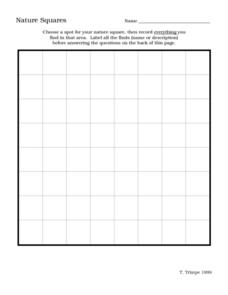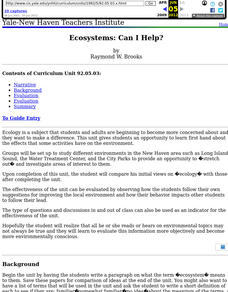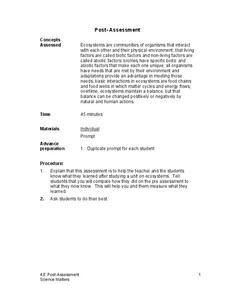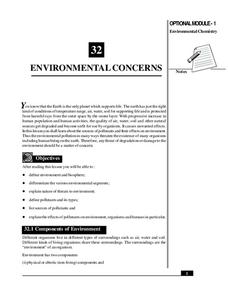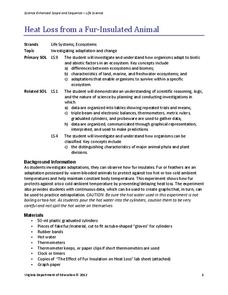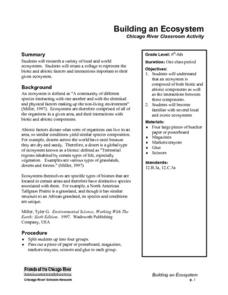Curated OER
Vocabulary: Kansas Prairies
Students explore the ecosystem by reviewing scientific vocabulary terms. In this environmental awareness activity, students identify the differences between abiotic and biotic factors and their relationship to the Earth. Students define...
Curated OER
Urban Safari: A Walk on the Wild Side
Learners discover the urban ecosystem through a series of activities. They explore both the biotic and abiotic factors of the urban environment.
Curated OER
Soaping Up in the Great Lakes
Students investigate the effects of a variety of cleaning agents on the biotic and abiotic properties in the Great Lakes. They work with student from other schools to determine a workable solution that reduces the impact of cleaning...
Curated OER
Principles of Ecology
In this ecology worksheet, students will fill in a graphic organizer showing the relationship organisms have with their environments and with each other. This includes biotic and abiotic factors, tropic levels, and ecological pyramids....
Curated OER
What's in the Water? - Stream Side Science
Here is a complete activity in which young biologists or ecologists test the pH, dissolved oxygen, turbidity and temperature of stream water. The class visits an actual stream and makes observations of the site. They use scientific...
Teach Engineering
Biomes and Population Dynamics - Balance Within Natural Systems
How large can a population become? The fifth installment of a nine-part unit teaches young ecologists about limiting factors that determine the carrying capacity of species in the Sonoran Desert. Here is a PowerPoint to help present this...
Curated OER
Hawaii's Sandy Shores
Investigate Hawaii's sandy shore ecosystem! Start by creating a vocabulary list and having your class complete a KWL chart. Next, pass out the "I think of" sheet. Each learner will then choose a word from a beach bucket and add it to...
Curated OER
A Walk in the Woods
Eighth graders observe and identify the different levels of the forest. In this forest zones lesson students observe, identify and name a variety of forest components and describe how humans impact the forest ecosystem.
Curated OER
Hands on Biome--Building
Students create a model biome. In this ecology activity, students use materials to create a model biome. There is an extension activity that allows students to write about plants and animals and their specific biome.
Curated OER
Critters in Your Own Backyard
Pupils identify various animals and their habitats, as well as their specific traits In this animal habitat lesson, students list animals they've seen in their backyard. Pupils select one animal and do research. Students then answer 9...
Curated OER
Chewin' in the Chesapeake
High schoolers examine a web page on food webs and select a habitat to research. In this research lesson students identify the organisms found in the food web and present their findings to the class.
Curated OER
Biotic Factors
Students identify individual organism, a species, and a population within the study community. They identify biotic factors at the site and attempt to characterize the site's species diversity.
Curated OER
Nature Squares
In this nature observation worksheet, students set up a grid on a small plot of land and record all biotic and abiotic items in the grid. They complete 5 short answer questions based on their observations.
Curated OER
Ecosystems: Can I Help?
Students study how some activities effect the environment and ecosystems.
Curated OER
The Principles of Ecology
In this ecology worksheet, students complete a word search by finding 21 terms associated with habitat, ecology, biosphere, and niche.
Curated OER
The Marvels of Mud
Young scientists roll up their sleeves and get a little dirty in this three-day earth science investigation. Following the scientific method, children monitor the growth of algae in pond water samples in order to determine the role that...
Science Matters
Ecosystem Pre-Assessment
Test scholars' knowledge of ecosystems with a 20-question pre-assessment. Assessment challenges learners to answer multiple choice questions, read diagrams, and complete charts.
Science Matters
Post-Assessment
Twenty questions make up an assessment designed to test super scientists' knowledge of ecosystems. Scholars answer multiple-choice and short-answer questions about organisms, food chains, energy flow, and more.
National Institute of Open Schooling
Environmental Concerns
Every year, more than 14 billion pounds of garbage is dumped into the oceans of the world, most of which is plastic and toxic to ocean life. Lesson 32 in the series of 36 focuses on environmental concerns, specifically pollution. Under...
Virginia Department of Education
Heat Loss from a Fur-Insulated Animal
How do animals adapt to weather changes? Provide your class with the ability to understand adaptations and body temperature as they participate in this hands on experiment, using fake fur and hot water. Pupils collect data and analyze...
NASA
Is It Alive?
Determining whether or not something is living can be more difficult than it seems. Put your young scientists to work defining their own criteria to identify life, then work with three samples to see if they are alive or not.
Curated OER
Hedgerows
Hedgerows prevent soil erosion, capture pollutants running off fields, store carbon to help combat climate change, and provide homes for predators of many pest species. The biodiversity lesson begins with an activity that discusses why...
Curated OER
Building an Ecosystem
Students research a variety of local and world ecosystems. Students will create a collage to represent the biotic and abiotic factors and interactions important to their given ecosystem.Students will understand that an ecosystem is...
Curated OER
Ecosystems Connect
Students investigate ecosystems near their school and across the world. They examine both living (biotic) and non-living (abiotic) elements of each. They recognize ecosystems from various continents around the globe. The use of computers...
Other popular searches
- Biotic Abiotic
- Biotic and Abiotic Factors
- Biotic and Abiotic
- Abiotic Biotic Environment
- Abiotic Elements
- Abiotic and Biotic Elements
- Abiotic and Biotic Resources
- Biotic Abiotic Factors
- Abiotic Biotic Lab
- Ecosystems Abiotic Biotic
- Biotic Abiotic Pictures
- Abiotic Factors River






